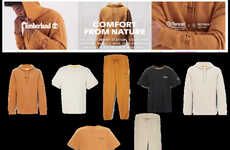
Puma Wilderness Collection Offers Eco-Friendly & Fair Trade Items
Katherinev123 — July 10, 2012 — Eco
References: shop.puma & brandchannel
Puma is on a mission to become one of the most sustainable sportswear brands, and its latest Puma Wilderness Collection is a step in the right direction. The new line includes socially responsible clothing, shoes and accessories, with the majority sourced and made in Kenya.
Eighty percent of the items in the Puma Wilderness Collection, which was created in collaboration with Wildlife Works, are made out of fair-trade cotton while the remaining 20 percent is made from organic African cotton. However, the company aims to have the entire collection made from 100 percent fair-trade cotton by 2013.
The clothing, inspired by the African landscape and climate, features designs created in part by Wilderness Holdings Limited (WHL), a wildlife-preservation organization that runs safari camps and tours in Africa. Puma, with a 20 percent stake in the company, has been a longtime supporter of WHL.
Eighty percent of the items in the Puma Wilderness Collection, which was created in collaboration with Wildlife Works, are made out of fair-trade cotton while the remaining 20 percent is made from organic African cotton. However, the company aims to have the entire collection made from 100 percent fair-trade cotton by 2013.
The clothing, inspired by the African landscape and climate, features designs created in part by Wilderness Holdings Limited (WHL), a wildlife-preservation organization that runs safari camps and tours in Africa. Puma, with a 20 percent stake in the company, has been a longtime supporter of WHL.
Trend Themes
1. Eco-friendly Sportswear - The trend for eco-friendly sportswear is growing and companies can take advantage by developing products with recycled or sustainable materials.
2. Socially Responsible Clothing - Consumers are putting pressure on companies to be socially responsible and brands can meet that demand by developing fair-trade products or partnering with socially conscious organizations.
3. Localization of Production - The trend for localized production can benefit companies by reducing their carbon footprint and offering employment opportunities in developing countries.
Industry Implications
1. Sportswear Industry - The sportswear industry can improve its sustainability credentials by developing more eco-friendly and socially responsible products.
2. Fair Trade Industry - The fair trade industry can capitalize on the trend for socially responsible products by partnering with brands and providing ethically sourced materials.
3. African Fashion Industry - The African fashion industry can benefit from localization of production by offering employment opportunities and showcasing unique designs inspired by local culture and landscapes.
3.8
Score
Popularity
Activity
Freshness























